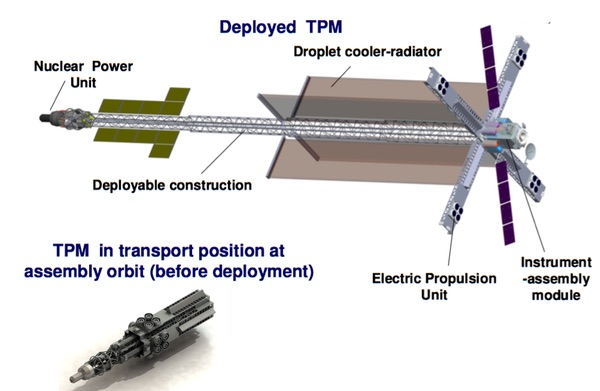Pure speculation, which I knowingly built on wobbly foundations of if and perhaps and surrounded by an electrified fence of caveats...
Now let me lower myself into my wheelchair and put on the dark glasses and black leather glove. Imagine this in a high-pitched pseudo-Germanic accent.
Strategic weapons are not bigger, longer-range tactical weapons. Nor are they held in reserve for devastating first strike or retaliation after a first strike by the enemy. Rather they are in active use to instil fear even before they are commissioned. Thus, the long standoff of the Cold War, or 'Mutual Assured Destruction,' was also called the 'Balance of Terror.' Fear was the point and utility of the strategic nuclear arsenals, not a consequence. It's slightly misleading to call a nuclear arsenal a 'deterrent' because they have wide-ranging effects beyond merely staying the finger over the red button.
IF this is a nuclear-armed and not merely nuclear-powered ASAT system, firing it would seem to be an act of self-destruction. However, deploying it with the apparent intention to use it introduces a new element of risk into diplomacy and strategy for everyone. A technological precedent here is MAD overall, more specifically Dead Hand, and the fictional Doomsday Machine of
Doctor Strangelove.

en.wikipedia.org
The doctrine that might underlie it is the so-called 'Madman Theory.'

en.wikipedia.org
In 1517, Niccolò Machiavelli had argued that sometimes it is "a very wise thing to simulate madness" (Discourses on Livy, book 3, chapter 2)… In his 1962 book, Thinking About the Unthinkable
, futurist Herman Kahn argued that to "look a little crazy" might be an effective way to induce an adversary to stand down.
Now, to buttress my unstable structure with overcooked spaghetti of 'who the Hell knows?', I'll use Madman theory to segue into the mists of Putinology.
We all remember this:
Margarita Simonyan, editor of state broadcaster RT and one of the Kremlin's highest-profile mouthpieces, declared on TV last night that the idea of Putin pressing the red button is 'more probable' than the idea that he will allow Russia to lose the war in Ukraine.

www.dailymail.co.uk
"We will go to heaven, while they will simply croak... We're all going to die someday."
Not Putin's words but those of a (possibly overenthusiastic) mouthpiece. Putin has however frequently threatened the use of battlefield nuclear weapons because in Russian doctrine a tactical nuke is simply another form of high explosive. This gives the impression that the path to escalation has fewer hurdles.
Some people have characterised Russian threats as 'escalate to de-escalate.' This provides a more nuanced explanation:
I disagree somewhat with the assessment because it depends too much on calculation as a part of decision-making and less on the role of mythos or ethos. However, it supports the idea that the threat of first use is seen by the Russians as more useful than the threat of retaliation.
In his recent 'interview' with Tucker Carlson, Putin gave what was a two-hour lecture on his mythos of the Russian civilisation and his intensely-held resentments - as he has done for a domestic audience for years already. He casts Russia - and himself - in a messianic role, Muscovy as the 'Third Rome', and so forth. My use of 'civilisation' rather than 'nation' or 'state' is deliberate. There is an underlying sense of an historic mission in Putin's aims. He has made no secret of his desire to restore not just the boundaries of the Soviet Union, but the Russian Empire. The leaders of the Baltic, Nordic and Eastern European states fully appreciate this.
The vision is apocalyptic - not in the sense that it inevitably involves universal destruction in reality but in the original sense of the word, an 'unveiling.' According to this view, what happens in the mundane world is a shrouded version of what is really happening on a cosmic plane. The holy leader presents themself as being able to see though the veil.
I think that Putin himself believes a lot of this and is determined to by whatever means recreate a Russian Empire based on his mythology. How much he believes I don't know and this is where the Madman theory (or acting like a Bond villain for that matter) applies: it's not necessary that he be mad, just that he is seen as potentially mad... or just enigmatic and on a hair trigger.
Lately we've seen a lot of talk and demonstration of 'hybrid war' and
maskirovka (masked war). As a former KGB man, Putin is well experienced in psychological operations as a part of war and diplomacy and indeed he has used these extensively already. Then we have Steve Bannon talking about 'flooding the zone with bullshit' to present a moving target to the enemy.
I remember seeing a cartoon showing two negotiators coming out of a meeting. One says to the other, 'The problem is that we think we're both playing chess and they think we're both playing poker.'
So, in short, a nuclear ASAT,
assuming that that is what it is, is an irrational weapon but that does not make it useless. Like strategic nuclear weapons, it has a politically useful
mystique. Putin has shown that he's willing to unilaterally exit treaties and Western powers will be eager to negotiate new ones. This will influence future treaty negotiations, potentially in Russia's favor.
As a footnote, while the Western powers have been sanctioning various oligarchs and military and intelligence officials, Russia is also sanctioning Western
historians, underlining Putin's interest in enforcing his particular mythos on the same level as purely military and economic power. Here's an interview with one such sanctioned historian.
View: https://www.youtube.com/watch?v=afKdYPwIKSQ&t=23s
Now if you'll excuse me, I have to fight with my arm.

 abcnews.go.com
abcnews.go.com








